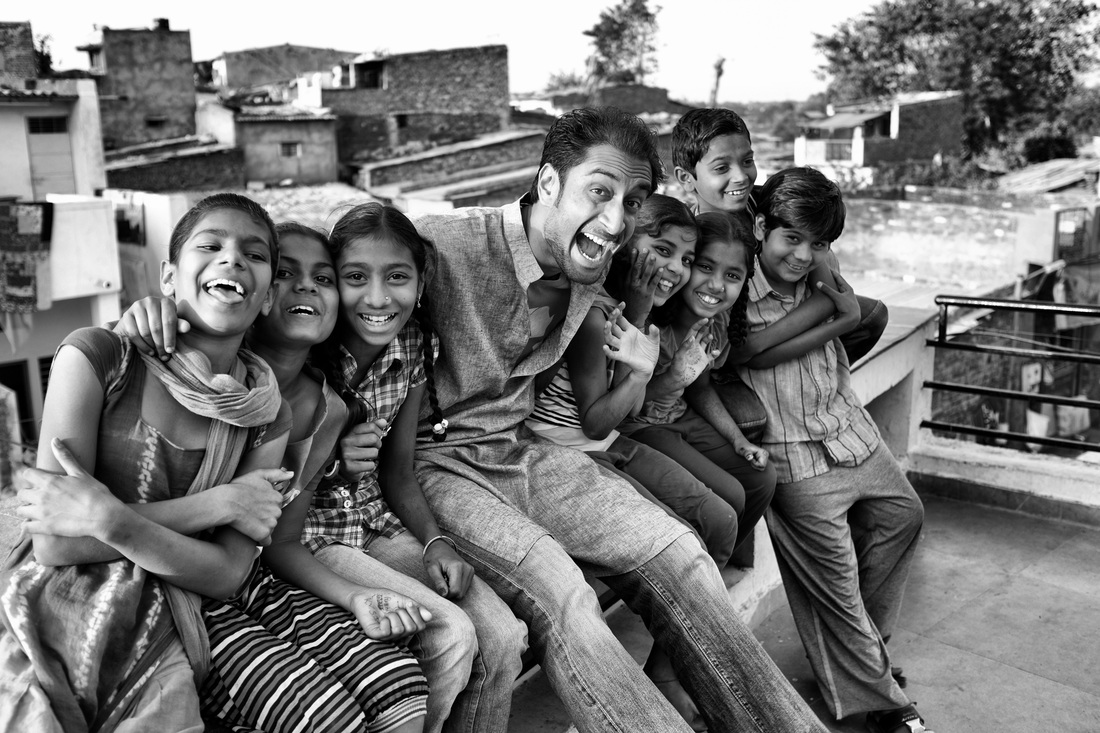Rapper Turns Success into Service for Humanity Nimo enjoying time with the kids he works with in India. (Photo by Rahul Pardesani) Nimo enjoying time with the kids he works with in India. (Photo by Rahul Pardesani)
by Abby Cunningham
In the early 2000s, Nimesh Patel caught a massive wave. He rode it beautifully, but not in the blue Pacific near L.A. where he spent his childhood, but along the northern edges of the East Coast. His breaking wave ultimately led him to New York City, and with it came a remarkable degree of success. After earning a business degree from the prestigious Wharton School in Philadelphia, Nimesh went on to a career on Wall Street. In his spare time, he devoted himself to his art—that is, the art of rap music—that gave him an outlet for his unusual talent of building bridges between vastly different worlds. His group, Karmacy, became an underground success with the MTV rap hit “Blood Brothers.” The story of material success set against a backdrop of spiritual longing and renunciation resonated deeply with urbanites everywhere, especially with the rising and economically powerful demographic of South-Asian Americans. His business career continued to soar, and soon Nimesh (known as Nimo), found himself in Pune, India as head of an animation studio that he’d also founded, working long into the night, pushing, striving, yet hungry for something more. As his success grew, so did the gulf between his work and his values. During a particularly intensive late-night creative session, a burning question welled up inside: “Is this all there is?” Ironically, this line of existential questioning was inspired on some level by a night on the town years earlier. Nimo’s friends had invited him to a show in New Jersey (of all places) to see the dance-drama performance group Ekata (meaning unity). Funded by the nonprofit Manav Sadhna based in Gandhi Ashram, the group included children from some of India’s most underprivileged communities. The performance struck a deep chord within him. After a period of introspection, Nimo decided to extract himself from the career he’d worked so hard to build. His journey then led him to the Gandhi Ashram in Ahmedabad, India, where he stepped away from all forms of music, even renouncing it entirely for a year. Nimo spent the next several years in residence at the ashram, both serving and learning from the local children who lived in abject poverty but nevertheless had so much to share. “It helped me rewire,” remembered Nimo. Nimo also gave back, sharing his talents, mentoring the kids and instilling in them the art of creative discipline. He realized he wanted to help this talented new generation share their gifts with the world. Once again, inspiration struck. He inquired about the possibility of doing a kind of encore performance of Ekata. In collaboration with Manav Sadhna, Nimo created Ekatva (meaning oneness), a group of 16 kids handpicked from local slums, and developed their performance skills for two years. In 2010, the two-month Ekatva World Tour was warmly received throughout India, the UK and across America. When the kids returned home, both Nimo and the nonprofit saw to it that the children received funding for their education, giving back to the kids who had given the world so much of themselves through their artistry. Nimo also returned to India to serve at Gandhi Ashram once again. For the first time in seven years, he began writing new music, but this time with a different twist. The entire Ekatva journey became the inspiration for Empty Hands Music, an album project whose stated mission is to ... “spread seeds of goodness in the world through selfless service, music and love” that offers its music downloads free to all listeners as “gifts to the world.” Now back in the U.S. and back on tour as a musician, Nimo plans to return to India after his brisk tour schedule. “In this process of using music as a tool, I’ve really found ways to serve,” Nimo explained. “At this phase, I feel like I’m really able to go a little more in terms of breadth of society and connecting and growing in that way.” It is easy to reflect on the story of the incredible luck and good fortune of one man. What is perhaps most inspiring, though, is just how practical—and universal—his message is: We can begin a life of service right now. “We can be serving any time, any point of the day; we don’t need to wait to volunteer at a non-profit or when we have free time. Service to humanity means serving all walks of life,” said Nimo. “Everyone is suffering in their own ways and if we can sprinkle a little love or kindness in anyone’s days, that is a huge offering.” More Information: 
If you like this story, please consider taking out a gift-based subscription.
|
|





